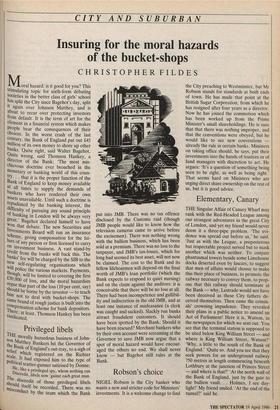CITY AND SUBURBAN
Insuring for the moral hazards of the bucket-shops
CHRISTOPHER FILDES
Moral hazard: is it good for you? This stimulating topic for sixth-form debating societies in the better class of girls' school has split the City since Bagehot's day, split it again over Johnson Matthey, and is about to recur over protecting investors from default. It is the term of art for the element in a financial system which makes people bear the consequences of their choices. In the worst crash of the last century, the Bank of England put out £45 million of its own money to shore up other banks. Quite right, said Walter Bagehot. Quite wrong, said Thomson Hankey, a director of the Bank: 'The most mis- chievous doctrine ever broached in the monetary or banking world of this coun- try.. . that it is the proper function of the Bank of England to keep money available at all times to supply the demands of bankers who have rendered their own assets unavailable. Until such a doctrine is repudiated by the banking interest, the difficulty of pursuing any sound principle of banking in London will be always very great.' Bagehot declared himself to have Won that debate. The new Securities and Investments Board will run an insurance scheme, giving compensation for the fai- lure of any person or firm licensed to carry investment nvestment business. A vast stand-by credit from the banks will back this. The banks' fee will be charged by the SIB to the new self-regulating organisations which will police the various markets. Payments, though, will be limited to covering the first £30,000 of loss, and the moral hazardists argue that part of the loss (10 per cent, say) should be borne by the investor — to teach him not to deal with bucket-shops. The same brand of rough justice is built into the compensation scheme for bank depositors. There, at least, Thomson Hankey has been vindicated.


















































 Previous page
Previous page